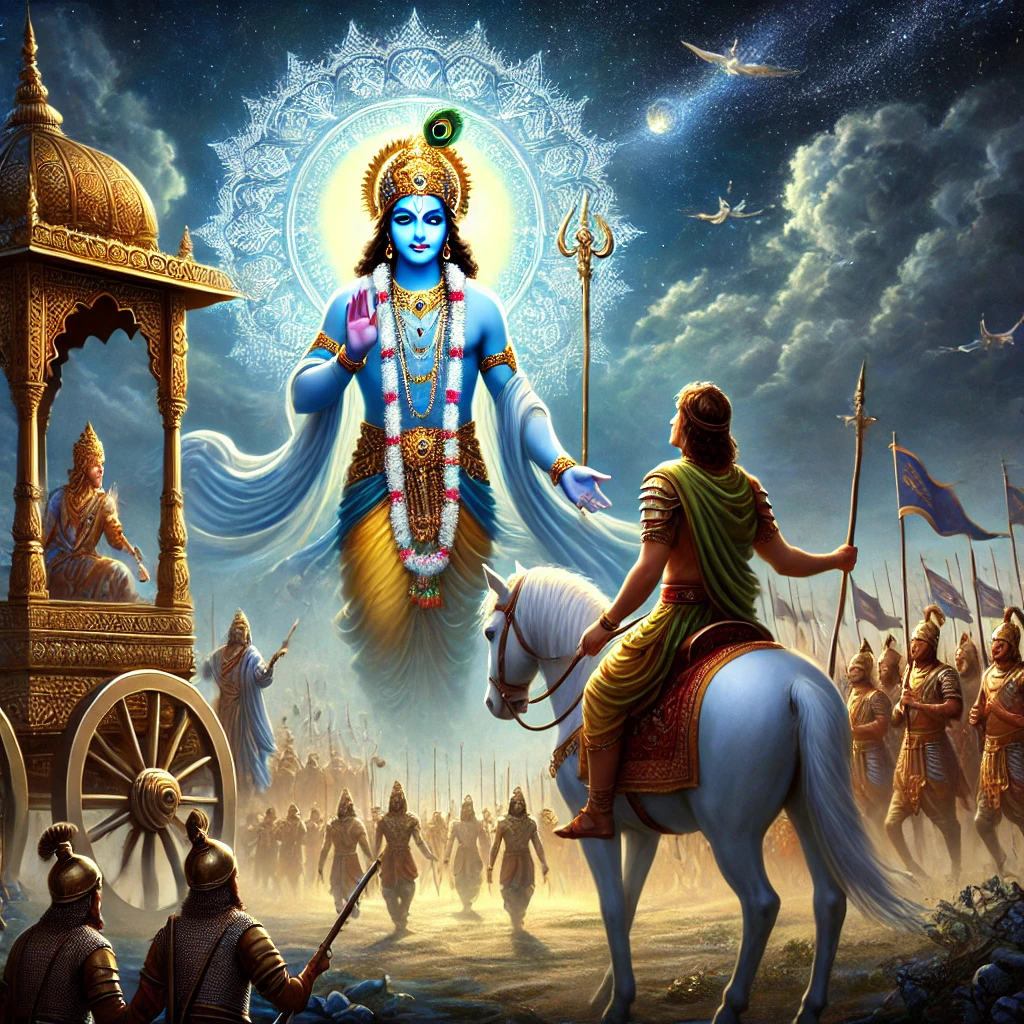The fourth chapter of the Bhagavad Gita, known as Jñāna Karma Sannyāsa Yoga (The Yoga of Knowledge and Renunciation of Action), is a profound discourse on the significance of divine wisdom, selfless action, and the eternal nature of dharma. In this chapter, Lord Krishna explains the origins of yoga, the role of divine incarnations, and the importance of knowledge in attaining liberation.
1. The Eternal Yoga and Its Transmission (Verses 1–10)
Krishna begins by revealing that He originally imparted this sacred knowledge of yoga to the sun god (Vivasvan), who then passed it to Manu and the royal sages (Rajarshis). However, over time, this wisdom was lost. Now, Krishna is reintroducing it to Arjuna because he is His devoted friend and disciple.
This section highlights the timeless nature of dharma—how divine knowledge is passed down through generations, but needs renewal when forgotten by humanity.
2. The Concept of Divine Incarnations (Verses 7–8)
One of the most famous teachings of the Gita appears in these verses:
“Whenever there is a decline in righteousness (dharma) and a rise in unrighteousness (adharma), I manifest myself.” (4.7)
“To protect the virtuous, destroy the wicked, and establish dharma, I incarnate in every age.” (4.8)
Here, Krishna introduces the concept of avatars—divine incarnations who descend to restore balance in the world. This teaching reassures humanity that divine intervention occurs whenever righteousness is in peril.
3. The Power of Knowledge and Karma (Verses 11–24)
Krishna emphasizes that people approach Him in different ways, and He reciprocates accordingly. Some seek material gains, others spiritual enlightenment, but all paths ultimately lead to Him.
He also explains that actions performed with wisdom and detachment from the results do not bind a person in karma. This is the essence of karma yoga—acting selflessly without being attached to rewards.
4. The Purifying Power of Knowledge (Verses 25–42)
Krishna extols the transformative power of jñāna (knowledge), stating that true wisdom burns away ignorance just as fire burns fuel. He encourages Arjuna to seek knowledge from realized sages with humility and dedication.
One of the key verses here is:
“Nothing is as purifying as knowledge; in due time, one who is perfected in yoga realizes this truth within.” (4.38)
By understanding the true nature of existence, one attains moksha (liberation) and is freed from the cycle of birth and death.
Key Takeaways from Chapter 4
- Yoga is Eternal – The teachings of the Gita are timeless and periodically revived by divine intervention.
- Krishna as the Divine Incarnation – God manifests whenever dharma is in decline.
- Karma Without Attachment – Actions performed selflessly, without desire for rewards, lead to liberation.
- Knowledge as Liberation – True wisdom destroys ignorance and leads to spiritual enlightenment.
- Seek a Guru – Learning from a realized teacher helps in understanding spiritual truths.
Conclusion
Chapter 4 of the Bhagavad Gita bridges the concepts of karma (action) and jñāna (knowledge), teaching that wisdom combined with selfless action leads to liberation. Krishna urges Arjuna—and all seekers—to cultivate both devotion and discernment, thereby transcending worldly attachments.
This chapter serves as a guiding light for those navigating life’s challenges, reminding us that divine wisdom and righteous action can elevate us toward ultimate peace and self-realization.

Leave a Reply